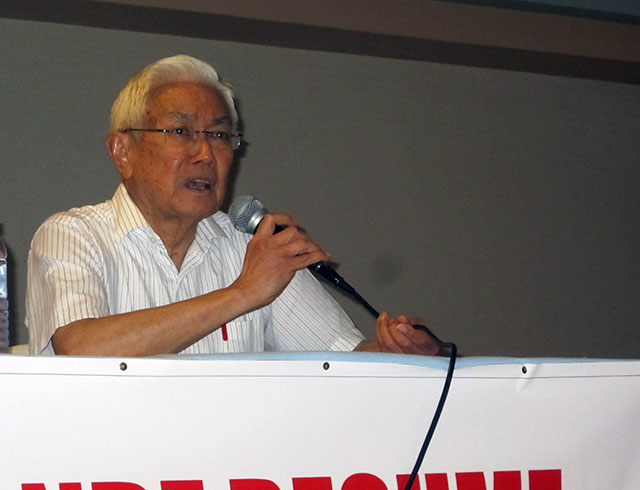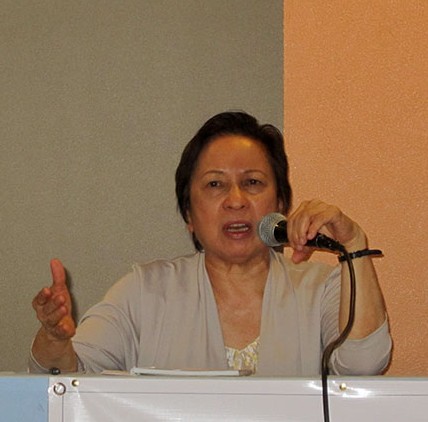
Luis Jalandoni, chairman of the peace panel of the National Democratic Front of the Philippines (NDFP), calls on the Aquino administration to resume peace talks with the NDFP in a forum, April 8. (Photo by Ronalyn V. Olea / Bulatlat.com)
“If the Aquino administration has the political will, peace talks with the NDFP could move forward.”
The National Democratic Front of the Philippines (NDFP) said it is willing to sit down and talk with the Government of the Philippines (GPH) any time.
Formal peace talks between the GPH and the NDFP have been in impasse since February 2011. Several informal talks were held in the hope of resuming the formal talks but to no avail.
Jalandoni said that a special GPH delegation met with the NDFP panel in the Netherlands in October 2014 to discuss the possibilities of resuming the formal talks.
The same GPH team came back in December 2014 and talked about the possibilities on the resumption of formal talks, the release of detained NDFP consultants, the forging of Comprehensive Agreement on Socio-Economic Reforms (Caser) within six months, among others.
There are 15 NDFP consultants currently detained in different detention centers all over the country. The NDFP has maintained that the arrest and detention of their consultants violate the Joint Agreement on Safety and Immunity Guarantees (Jasig).
The GPH team, according to Jalandoni, came back in February this year. “The Mamasapano incident became a big factor in the resumption of formal talks,” he said.
On January 25, the Philippine National Police launched an operation against two terrorists in Tukanalipao, Mamasapano, Maguindanao. The bungled operations left 44 SAF police officers, 18 Moro rebel fighters, and five civilian dead. The tragedy has affected the peace talks between the GPH and the MILF.
Jalandoni added that “the Aquino regime is preoccupied to the deepest extent in the Mamasapano incident.” “The GPH does not want to talk with us anymore. They said they are concentrating on the Mamasapano and the MILF,” Jalandoni said.
The NDFP panel chief welcomed the recent statements of Rep. Silvestre Bello III and of Archbishop Antonio Ledesma calling on the GPH to return to the negotiating table with the NDFP.
Bello served as chairman of the government peace panel and had been involved in the peace talks with the NDFP since the Ramos administration.
The Philippine Ecumenical Peace Platform (PEPP), the organizer of the forum, said it invited the GPH panel to present updates but the latter cancelled its confirmation in the last minute.
Political will
Jalandoni said if the Aquino administration has the “political will,” peace talks with the NDFP could move forward.
He said the NDFP has undertaken initiatives to foster the resumption of formal talks.
He said that the Communist Party of the Philippines and the New People’s Army carried out releases of prisoners of war as a goodwill measure for the resumption of peace talks. Political prisoners, Jalandoni said, also staged fasting and hunger strike during the Papal visit to highlight their call for the resumption of peace talks.
If only the Aquino administration show political will, it is possible to approve Caser within six months, he said.
Jalandoni said the NDFP has also formed its Working Group on Political and Constitutional Reforms and is willing to form another group to discuss cessation of hostilities and disposition of forces.

Connie Ledesma, a member of the National Democratic Front of the Philippines (NDFP) peace panel, calls on the government to respect all previously signed agreements in a forum, April 8. (Photo by Ronalyn V. Olea / Bulatlat.com)
In the same forum, Connie Ledesma, a member of the NDFP peace panel, admitted, “Sometimes, it’s as if we are on a treadmill but we want peace to go forward.”
Previous agreements show that moving forward is not impossible. Ledesma said that the all agreements signed by both parties “are good documents that both sides worked on.”
Ledesma cited the CARHRIHL as an example. At first, both sides were “East and West” but had slowly come together. “Every comma, every period, every phraseology was approved by both sides,” she said.
Ledesma said the same is true with the The Hague Joint Declaration. “The GPH called it a document of perpetual division. It’s meant to be a unity document, a document that serves as the framework for the peace talks.”
She urged peace advocates to study all the agreements signed by both parties and to continue pushing for the resumption of formal talks between the GPH and the NDFP.
Jalandoni said the NDFP has undertaken initiatives to foster the resumption of formal talks. He said that the Communist Party of the Philippines and the New People’s Army carried out releases of prisoners of war as a goodwill measure for the resumption of peace talks. Political prisoners, Jalandoni said, also staged fasting and hunger strike during the Papal visit to highlight their call for the resumption of peace talks.
Jalandoni also said the NDFP has prepared its draft on the Caser, the next substantive agenda item in the peace talks, as early as 1999 and has been improved and updated since.
The Hague Joint Declaration, the framework agreement for the peace talks between the GPH an the NDFP, sets five substantive agenda which are human rights and international humanitarian law, socio-economic reforms, political and constitutional reforms, end of hostilities and disposition of forces. The Comprehensive Agreement on Respect for Human Rights and International Humanitarian Law was signed by both parties in 1998.
Jalandoni said if the Aquino administration has the political will, it is possible to approve Caser within six months.
Jalandoni said the NDFP has also formed its Working Group on Political and Constitutional Reforms and is willing to form another group to discuss cessation of hostilities and disposition of forces.
In the same forum, Connie Ledesma, a member of the NDFP peace panel, admitted, “Sometimes, it’s as if we are on a treadmill but we want peace to go forward.”
Previous agreements show that moving forward is not impossible. Ledesma said all agreements signed by both parties “are good documents that both sides worked on.”
Ledesma cited as the CARHRIHL as an example. At first, both sides were “East and West” but had slowly come together. “Every comma, every period, every phraseology was approved by both sides,” she said.
Ledesma said the same is true with the The Hague Joint Declaration. “The GPH called it a document of perpetual division. It’s meant to be a unity document, a document that serves as the framework for the peace talks.”
She urged peace advocates to study all the agreements signed by both parties and to continue pushing for the resumption of formal talks between the GPH and the NDFP.
http://bulatlat.com/main/2015/04/09/ndfp-to-aquino-govt-were-ready-for-peace-talks/

No comments:
Post a Comment
Note: Only a member of this blog may post a comment.